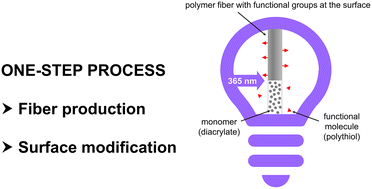RSC Applied Polymers has published its first articles. To celebrate this we wish to introduce some of our #RSCAppliedfirst50 authors and their recently published articles.
In this post we feature an introduction to Simultaneous photo-induced polymerization and surface modification by microfluidic spinning to produce functionalized polymer microfibers: Effect of their surface modification on cell adhesion written by the team of researchers behind the paper.
An Introduction to Simultaneous photo-induced polymerization and surface modification by microfluidic spinning to produce functionalized polymer microfibers: Effect of their surface modification on cell adhesion by Dr Delphine Chan-Seng et al.
Microfluidics refers both to the science of fluid flows (liquid or gas) in channels whose characteristic length is of the order of a few dozen to several hundred micrometres, as well as to the techniques and objects needed to manipulate them. As such, microfluidics can be considered for the preparation of polymers with various shapes ranging from spherical particles to fibres. Our group has been recently focusing its interest on producing polymer microfibers by photopolymerization using a capillary-based microfluidic device. We demonstrated the control of the features of the fibres obtained through the operating parameters and the nature of the monomers used. In this work, we report the first example of simultaneous formation of the polymer microfibers and their surface modification in a simple and fast one-step process. Acrylate monomers present in the core phase were photopolymerized, while the surface of the fibre was modified thanks to the presence of reactive molecule towards acrylate in the continuous phase. The effect of the modification of the fibre surface was investigated in terms of wetting properties and ability to promote cell adhesion. The fibres modified using molecules bearing multiple thiol groups were the more promising exhibiting a decrease in hydrophilicity at the fibre surface and an increase in cell adhesion. The advantages of microfluidic spinning (continuous synthesis avoiding problems of batch-to-batch reproducibility issues) combining with those of our strategy to modify polymer fibres without post-production modification (cost and time reduction) offer an appealing approach in the fields of functional polymer fibres developed for a wide range of applications.

Dr Wasif Razzaq
Wasif Razzaq is an accomplished researcher and assistant professor specializing in polymer science and engineering. He holds a Ph.D. in process engineering with a focus on polymer science and engineering from the University of Strasbourg, France. With expertise in microfluidic spinning of polymer microfibers and the development of novel and smart materials, he has made significant contributions to the field. He has published several research papers in renowned journals and has presented his work at international conferences. In addition to his research, he has a strong teaching background, having served as an assistant professor in Department of Materials, National Textile University, Pakistan

Prof. Christophe Serra
Christophe Serra is a Distinguished Professor of Chemical Engineering at the University of Strasbourg (France). He received his Ph.D. in 1996 from the University Paul Sabatier in Toulouse (France) with a work on hollow fibres. Then, he spent 18 months as a postdoctoral researcher at Rice University (Houston, TX) making CFD simulations on rotating and stationary membrane disk. Since 1998. He has been a faculty member of the University Louis Pasteur which became the University of Strasbourg in 2009. His researches concern the development of new microfluidic-assisted polymer processes for the synthesis of architecture-controlled polymers as well as functional micro- and nanostructured polymer particles and fibres. In 2015 he joined the Charles Sadron Institute (ICS, UPR 22 CNRS) and took the head of the group on Polymer Engineering and Process Intensification (IP²).
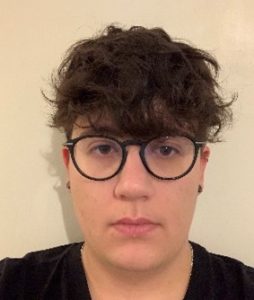
Candice Dusouillez
Candice Dussouillez is assistant engineer in biology at the University of pharmacology in Illkirch-Graffenstaden and work under the supervision of Antoine Kichler. After a master degree in virology in the University of Strasbourg, she joined the 3Bio team for the required internship to work on cancerology in 2019 and was then recruited in the team to work on vectorization of drugs, proteins and nucleic acids alongside Antoine Kichler.

Dr Naji Kharouf
Naji Kharouf is Associate Professor in Faculty of Dentistry and the department of Biomaterials & Bioengineering INSERM UMR_S 1121 at the Strasbourg University, France. He has been working in dental biomaterials, endodontic treatment, coronal restorative techniques, bioactive molecules, microsurgical skeels and dental morphology since 2018 (H-Index: 14, 2024). He has been speaker in several international conferences. He has published, in collaboration with internationally researchers, more than 68 scientific papers in international peer-review journals with high impact in the dental and biomaterials field. He has a Certificate in Oral Implantology, a Master degree in Biomaterials for Health, a Microsurgical Diploma, an Esthetic of Smile Diploma, a Ph.D. in Endodontics, a Post-Doc in Dental materials and finally a H.D.R. in Dental materials modified with graphene.
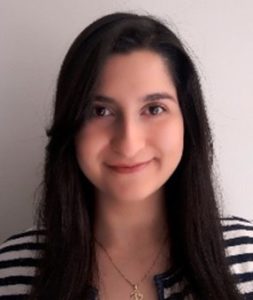
Irene Andrea Acuña Mejía
Irene Andrea Acuña Mejía obtained a chemical engineering diploma from Universidad Nacional de Colombia in Bogota, Colombia in 2018. Afterwards, she obtained her master’s degree in Polymer Science and Sustainable Materials at the University of Strasbourg and the University of Freiburg in 2021. Then, she joined IP2 team at Institut Charles Sadron as an engineer in 2022. She worked on the development of an intensified process for the continuous production of hybrid polymeric microparticles with solvatochromic properties using microfluidics, encapsulating metallic nanoparticles within a polymeric matrix. Currently, her work focuses on the production of functionalized polymersomes using different microfluidic devices.
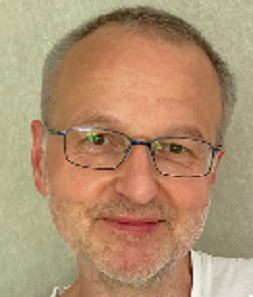
Dr Antoine Kichler
Antoine Kichler is research Director at the CNRS. He received his Ph.D. in pharmaco-chemistry in 1994 from the University of Strasbourg (France). After two post-doctoral positions he moved to Genethon in Evry in 1997 (France) to head a group working on non-viral gene delivery before joining the Faculté de Pharmacie of Strasbourg in 2012. His research interests are in the field of vectorization of anti-tumoral drugs, proteins and nucleic acids (DNA, mRNA, siRNA) using a variety of delivery systems including cell penetrating peptides, polymers and lipids.
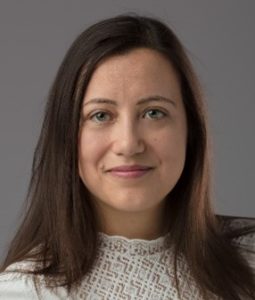
Dr Delphine Chan-Seng
Delphine Chan-Seng is a CNRS (French National Center for Scientific Research) researcher at the Institut Charles Sadron in Strasbourg (France). She carried out her graduate studies with Michael K. Georges (Ph.D., 2007, University of Toronto, Canada) and did a postdoctoral stay in the group of Todd Emrick (2007-2011, University of Massachusetts at Amherst, USA) working on projects in the field of polymer chemistry. In 2011, she started her independent career as a CNRS researcher joining the Institut Charles Sadron. Her research focuses on designing polymers, among which some are stimuli-sensitive, for biomedical applications (drug and gene delivery, bioimaging, etc.) by combining organic and polymer chemistry, peptide synthesis, and macromolecular engineering.
Simultaneous photo-induced polymerization and surface modification by microfluidic spinning to produce functionalized polymer microfibers: the effect of their surface modification on cell adhesion
Wasif Razzaq, Christophe A. Serra, Candice Dussouillez, Naji Kharouf, Irene Andrea Acuña Mejía, Antoine Kichlerc and Delphine Chan-Seng.
RSC Appl. Polym., 2024,2, 62-70. DOI: 10.1039/D3LP00032J.
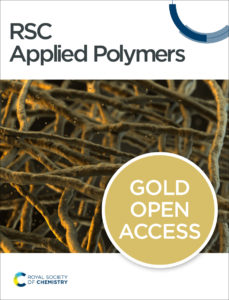 |
RSC Applied Polymers is a leading international journal for the application of polymers, including experimental and computational studies on both natural and synthetic systems. In this journal, you can discover cross-disciplinary scientific research that leverages polymeric materials in a range of applications. This includes high impact advances made possible with polymers across materials, biology, energy applications and beyond. |



